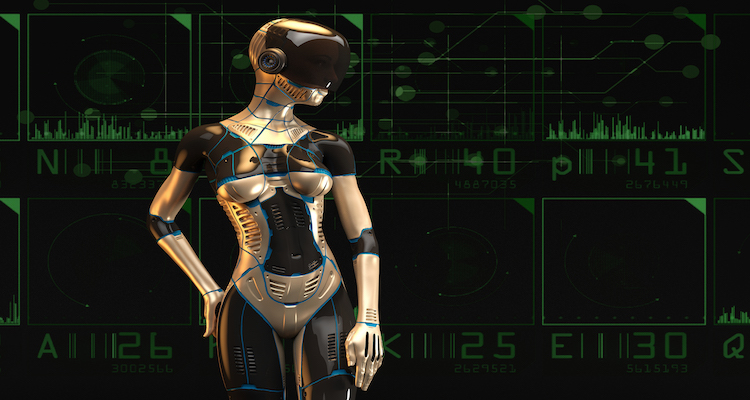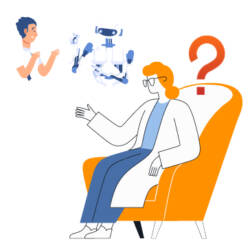How AI-Powered Sexbots Could Enhance, Not Replace Human Sexuality
Sex beyond biology—no humans, no problem?

With the rise of AI and the development of increasingly sophisticated artificial companions, it's easy to speculate that intimate and sexual experiences could someday be entirely replaced by technology.
Is this something we need to worry about, or will sexual interactions be better than ever? A report titled “The Rise of the Robosexuals,” co-authored by futurist Ian Pearson and Internet sex shop Bondara, suggests virtual reality sex will be very common in 2030, and approximately 20 years later, many people will be having sex with fully autonomous companions—adding robot sex will not harm human intimacy but enhance it.
Advancements in AI research
Artificial intelligence researchers have made significant strides in recent years, now utilized by a wide variety of industries, with the sex tech industry being no exception.
According to Simon Dubea human, a sexuality researcher specializing in human sexuality, sex tech, and Erobotics, “New possibilities for human-robot relationships are emerging. It's the wild west, as companies experiment and market new types of “experiences.”
Adding that “Artificial companions are not just about sex, but about what humans want from their relationships, their partners, and themselves. Sex robots are a reflection of human desires, fantasies, and needs, as well as a source of pleasure, companionship, and comfort.”
Artificial companions: realistic alternatives or substitutes?
A product of the intersection between AI, robotics, and the human desire for more intimate and satisfying experiences, sexbots produced by companies such as AI aitech and Sinthetics are continually developing progressively more and more lifelike models.
Meanwhile, other manufacturers are fitting their products with sensors, enabling them to respond to touch as well as verbal instructions. The Realbotix project, for example, is now selling an AI-equipped head that can be attached to RealDoll bodies.
They've also developed the RealDollX app, which lets you create a personality that can be integrated into their Harmony head.
Advantages and drawbacks
As we delve deeper into the possibility of a world without physical sexual interactions, it's worth considering the benefits and drawbacks of artificial companions. Regarding the pros, personalization could be one of their main advantages. Also, sexbots, especially for those who may have undergone trauma or have unique disability needs, might offer a safe and non-judgmental way to fulfill their sexual needs.
On the other side of the coin, we might have to deal with objectification. The creation and usage of sex robots may make women and other oppressed groups feel even more objectified and dehumanized.
However, Aimee van Wynsberghe, co-director of the Foundation for Responsible Robotics, argues that sexbots might do the complete opposite, saying, “You could think about people who feel uncomfortable going to a prostitute because they're putting another human being in that position, A robot will be more desirable for them.”
Similarly, Dr. David Levy, an artificial intelligence researcher and the author of Love and Sex with Robots, argues in the book that “artificial adult companions can foster emotional attachment rather than detachment and that they can complement and enrich human-human relationships.”
Further stating, “Artificial adult companions are designed to provide companionship, intimacy, and support to their users, who may otherwise feel lonely, isolated, or rejected. Artificial adult companions can help users cope with stress, anxiety, depression, or trauma by offering a safe and non-judgmental space to express their feelings and needs.”
The role of human connection and emotional intimacy
We're also in the middle of a massive sextech revolution, like the growing popularity of erotic virtual reality games.
It could be made all the better when haptic technology goes mainstream, allowing us to enjoy remote physical, long-distance sex, or fully immersive sexual experiences.
Looking farther forward, there might come a time when holograms or brain-to-brain interfaces, which also could directly stimulate our brain's pleasure centers, become the norm.
While many of these innovations are still a long way off, the rise of a new, digital-driven sexual identity, digisexuality, shows how much technology is also adding to our desires and sex lives.
“Many people will find that their encounters with artificial companions become central to their sexual identity, and some will come to prefer them to direct sexual encounters with humans,” Professor Wendy Moyle, a Program Director of the Healthcare Practice and Survivorship Program at the Menzies Health Institute, told NBC News,
Then there's the iDollator community, a burgeoning subculture of people who develop deep emotional connections with their synthetic partners.
Technology is already changing how people have physical sexual interactions, so it's just a matter of time before we see sexbots capable of utilizing artificial intelligence and other technologies to give us previously unheard-of sexual experiences.
Image Sources: Depositphotos

















